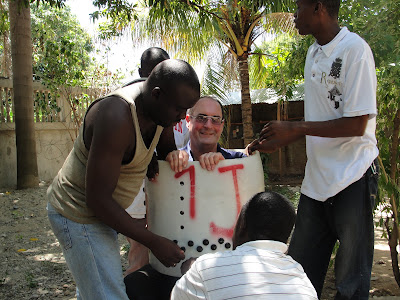Volunteer Robert Spencer is in Haiti again, continuing his dedicated support to Makouti Agro Enterprise in helping to improve the meat processing and quality practices in Haiti. He writes of his experience over the past week:
 |
| The team inserts feather plucking fingers. |
I have been volunteering my services in Haiti since 2006. I really do enjoy my time spent here, each visit is unique, and this time offered something totally different. During this visit to Cap Haitien I worked with Makouti Agro Enterprise on a project that supports opportunities for women in agriculture; more specifically, women raising chickens for meat production.
The concept, how it works, and successes are explained. Makouti identifies willing participants and provide them with the appropriate training. For a one time nominal fee Makouti agrees to provide participants with a portable poultry housing unit, necessary feed and equipment, and twenty baby chicks. When the birds reach an ideal marketing weight the participants are allowed to sell as many birds as they choose and keep what they want, but must reimburse Makouti a nominal percentage based on the potential market value of the entire flock. In exchange Makouti provides them with another twenty chicks and continues as long as everyone is satisfied. This tends to repeat on a six week cycle and provides a very lucrative income for the female farmers. It has been so successful that some of the women have been able to diversify into other agriculture endeavors.
 |
| A typical chicken project beginner kit |
Prior to this visit, Benito [FTF-Haiti Coordinator]
expressed the need to develop a prototype electric motor driven chicken plucker. I agreed to bring a manual and 150 rubber defeather fingers, with hopes we could find the remaining required materials in Haiti; what a challenge that turned out to be. During four days of shopping we were able to acquire the following materials: lumber, plastic barrel, metal drum lid, hardware, and one pulley. In between shopping sprees we were able to complete the following three phases: build the wooden frame work, cut the barrel and install the rubber fingers, and insert the fingers in the rotating, metal defeather disc. While we were unable to acquire all the parts (electric motor, v-belt, and etc.) to complete the project, the team understands what is needed and how to complete the prototype; we basically ran out of time.
Why such a project and so much effort? Benito explained how these women can sell these mature chickens for $5-$10 U.S. If they were to sell eight at $8 each that would be $64 of revenue generated every six weeks. May not seem like much, but in a country where the “suggested” minimum wage may be about $4-$6 per day, $64 makes for a nice supplemental income and the birds offer a meal or two for each participant’s family. Basically, it provides economic opportunities for women in a country where unemployment levels exceed forty percent. Given chicken is one of the most trusted and consumed forms of meat in Haiti, you begin to realize there is a substantial demand/opportunity.
 |
| Phase 3 of construction completed |
Why a chicken plucker? It facilitates volume and processing efficiencies. Based on some on-farm tests, using two people, about twenty-five chickens could be processed in eight hours, while a home-style chicken plucker can be expected to defeather two birds in less than a minute. Assuming enough female farmers in a rural community form a working cooperative, and on a regular schedule gather 100 birds for processing and retail, this would reduce processing times and generate about $800 to be divided among the group every six weeks! And, for a nominal fee they can offer their services to process other people’s birds. This model is expected to be implemented throughout various communities in Haiti, and to facilitate retail sales to nearby larger cities.
The FTF Program would like to thank Robert and the Alabama Cooperative Extension System for enabling these efforts through
Farmer to Farmer.




.png)

Comments
Post a Comment